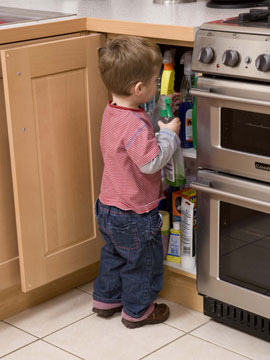Living in a death trap
With 600 deaths and 270,000 hospital admissions every
year, home is becoming one of the most hazardous places for children
under 16:
by Carol Aloysius
Home accidents causing disability and death in children under the age
of five has seen an upsurge, both globally and in Sri Lanka, in recent
years, with latest statistics citing injuries sustained in home
accidents as being one of the top five leading causes of death in this
age group. It also accounts for one fifth of annual hospital admissions
across the country.
Paediatricians have found that most injured children who suffer from
long term disability and chronic pain are unable to perform
age-appropriate everyday activities to their fullest potential during
their lifetime.
The tragedy is that these horrifying injuries that rob children of
their right to a happy carefree childhood, in a vast number of cases,
occur due to lack of adequate safety devices in the homes or sheer
neglect on the part of those looking after them. Nearly 98% of the
accidents could have been prevented, had those caring for them - be they
parents, grandparents or hired baby sitters carried out their task of
protecting the children from harm, with greater responsibility and
accountability.
Here two leading child experts share their views on debilitating
injuries sustained in the home-front, a subject which they emphasise is
eminently preventable.
Excerpts …
Poisoning cases have zoomed
 Dr
Deepal Perera, Chief Consultant Paediatrician, Cancer Hospital
Maharagama Dr
Deepal Perera, Chief Consultant Paediatrician, Cancer Hospital
Maharagama
Q: Home accidents are increasingly on the rise with children
as the main victims. Why is this? Is it because more children are alone
without parental care for most part of the day? Or is it because of the
irresponsible manner in which they are looked after by their caregivers?
A: Today, we see more accidents frequently occurring inside
homes due to several reasons. For one thing, most parents lead busy
lives, with mothers having given up their role of full time housewives
as in the past, and opting to work outside the home. Children are thus
left in the care of grand - mothers or neighbours, who may neglect their
responsibility as care givers.
Q: In general, what are the most common accidents that occur
in Sri Lanka that affect both adults and children alike?
A: Poisoning due to chemicals, medicines, road accidents,
burns, scalds, kerosene oil poisoning. Electrocution, drowning.
Q: Is there a change in the types of accidents that are now on
the increase compared to past accidents?
A: Today, the trend is more home accidents. Poisoning cases
from chemicals for example have zoomed over the past few years.
Unfortunately the victims are largely children and young adults.
|

yorkshirechildrenscentre.org.uk |
Q: Why?
A: Because these poisoning agents are kept within their reach
in their homes.
Q: What are the poisons that are used most commonly and where
are they found?
A: Poisoning agents I refer to can be found anywhere in the
house, but mostly kept in the bathroom and kitchens, e.g. chemicals,
acids , kerosene oil, paracetamol
Q: What about medical drugs? Some young adults with suicidal
feelings are known to deliberately ingest prescription drugs, such as
the ones used by their parents for diabetes and hypertension. What
happens?
A: Poisoning with medical drugs is reported very frequently.
Children can die if they are not treated urgently.
They should be immediately taken to hospital to be monitored in a
hospital setting.
Q: In the case of minor injuries in home accidents involving
young children what advice do you give parents?
A: Minors injuries can be managed at home. The wound should be
washed thoroughly and treated with an antiseptic solution
Q: What kind of wounds are you referring to?
A: Abrasions, muscle sprains.
Q: Treatment? How are children who have taken poison treated?
A: Some poisons can be treated by inducing vomiting. However
if poisoning is by ingesting acids, alcohols and kerosene oil, it is
very important that no attempt is made to induce vomiting, which can
aggravate the situation. There are also specific antidotes for some
kinds of poisoning .
Q: What is the advice you give to parents on the ‘dos’ and
‘don’ts’ in cases of poisoning in children?
|
Definition of
injury
The World Health Organisation (WHO)
defines injury as a bodily lesion resulting from an acute
exposure to physical agents such as mechanical energy, heat
, electricity , chemicals and ionizing radiation , or an
impairment of function of sudden lack of essential agents
such as in drowning, strangulation or freezing. Injuries can
be categorised in a number of ways – intentional or
unintentional. Intentional injuries include violence while
unintentional include road traffic accidents, drowning ,
burns, fires and falls and home injuries. According to
Epidemiology data on injuries in Sri Lanka categorised under
the indoor Morbidity and Mortality Register, traumatic
injuries continue to be the leading cause of hospitalization
since 1995 . Source – Health Ministry |
A: They should get advice from a qualified medical officer. It
is best to take the person, especially if it is a young child or elderly
person, to a hospital. If the doctor treating the patient is uncertain
about how to detect or treat the patient, he can always get the advice
from the Poisons Information Centre at the National Hospital of Sri
Lanka.
Q: Drowning is also a frequent accident that occurs at home.
Recently we have been reading reports of children drowning in small
buckets. Your comments?
A: Drowning is an increasing trend. This again is due to young
children not being supervised well. Just recently we had a case of a
child drowning in a tank prepared for ornamental fish. So, parents and
care takers must be watchful when a toddler goes near any container that
has water in it.
Q: What are the precautions you can suggest to minimise child
injuries?
A: The safety of children is the responsibility of all adults.
One must remember that children are still developing and not small
adults, capable of looking after themselves without proper supervision.
Q: What about road accidents where children are among the many
pedestrians who die due to careless, drunken and speeding drivers?
A: In Sri Lanka, road signs and road rules must be strictly
regulated and implemented. Penalties for drunken drivers should be
increased. Three-wheel drivers and motor cyclists who are both victims
and offenders should be advised.
Most importantly, children must be taught how to cross the road and
observe road rules. |

